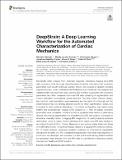DeepStrain: A Deep Learning Workflow for the Automated Characterization of Cardiac Mechanics
Author(s)
Morales, Manuel A; van den Boomen, Maaike; Nguyen, Christopher; Kalpathy-Cramer, Jayashree; Rosen, Bruce R; Stultz, Collin M; Izquierdo-Garcia, David; Catana, Ciprian; ... Show more Show less
DownloadPublished version (3.391Mb)
Publisher with Creative Commons License
Publisher with Creative Commons License
Creative Commons Attribution
Terms of use
Metadata
Show full item recordAbstract
<jats:p>Myocardial strain analysis from cinematic magnetic resonance imaging (cine-MRI) data provides a more thorough characterization of cardiac mechanics than volumetric parameters such as left-ventricular ejection fraction, but sources of variation including segmentation and motion estimation have limited its wider clinical use. We designed and validated a fast, fully-automatic deep learning (DL) workflow to generate both volumetric parameters and strain measures from cine-MRI data consisting of segmentation and motion estimation convolutional neural networks. The final motion network design, loss function, and associated hyperparameters are the result of a thorough <jats:italic>ad hoc</jats:italic> implementation that we carefully planned specific for strain quantification, tested, and compared to other potential alternatives. The optimal configuration was trained using healthy and cardiovascular disease (CVD) subjects (<jats:italic>n</jats:italic> = 150). DL-based volumetric parameters were correlated (&gt;0.98) and without significant bias relative to parameters derived from manual segmentations in 50 healthy and CVD test subjects. Compared to landmarks manually-tracked on tagging-MRI images from 15 healthy subjects, landmark deformation using DL-based motion estimates from paired cine-MRI data resulted in an end-point-error of 2.9 ± 1.5 mm. Measures of end-systolic global strain from these cine-MRI data showed no significant biases relative to a tagging-MRI reference method. On 10 healthy subjects, intraclass correlation coefficient for intra-scanner repeatability was good to excellent (&gt;0.75) for all global measures and most polar map segments. In conclusion, we developed and evaluated the first end-to-end learning-based workflow for automated strain analysis from cine-MRI data to quantitatively characterize cardiac mechanics of healthy and CVD subjects.</jats:p>
Date issued
2021Department
Harvard University--MIT Division of Health Sciences and Technology; Massachusetts Institute of Technology. Department of Electrical Engineering and Computer ScienceJournal
Frontiers in Cardiovascular Medicine
Publisher
Frontiers Media SA
Citation
Morales, Manuel A, van den Boomen, Maaike, Nguyen, Christopher, Kalpathy-Cramer, Jayashree, Rosen, Bruce R et al. 2021. "DeepStrain: A Deep Learning Workflow for the Automated Characterization of Cardiac Mechanics." Frontiers in Cardiovascular Medicine, 8.
Version: Final published version